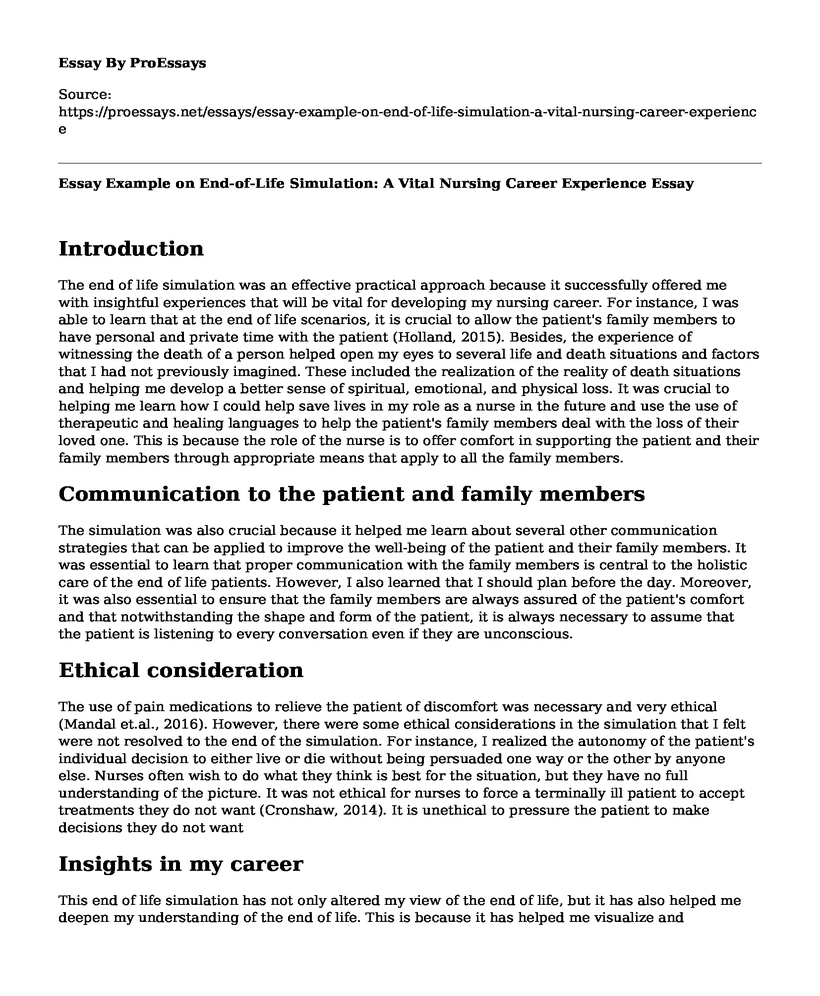Introduction
The end of life simulation was an effective practical approach because it successfully offered me with insightful experiences that will be vital for developing my nursing career. For instance, I was able to learn that at the end of life scenarios, it is crucial to allow the patient's family members to have personal and private time with the patient (Holland, 2015). Besides, the experience of witnessing the death of a person helped open my eyes to several life and death situations and factors that I had not previously imagined. These included the realization of the reality of death situations and helping me develop a better sense of spiritual, emotional, and physical loss. It was crucial to helping me learn how I could help save lives in my role as a nurse in the future and use the use of therapeutic and healing languages to help the patient's family members deal with the loss of their loved one. This is because the role of the nurse is to offer comfort in supporting the patient and their family members through appropriate means that apply to all the family members.
Communication to the patient and family members
The simulation was also crucial because it helped me learn about several other communication strategies that can be applied to improve the well-being of the patient and their family members. It was essential to learn that proper communication with the family members is central to the holistic care of the end of life patients. However, I also learned that I should plan before the day. Moreover, it was also essential to ensure that the family members are always assured of the patient's comfort and that notwithstanding the shape and form of the patient, it is always necessary to assume that the patient is listening to every conversation even if they are unconscious.
Ethical consideration
The use of pain medications to relieve the patient of discomfort was necessary and very ethical (Mandal et.al., 2016). However, there were some ethical considerations in the simulation that I felt were not resolved to the end of the simulation. For instance, I realized the autonomy of the patient's individual decision to either live or die without being persuaded one way or the other by anyone else. Nurses often wish to do what they think is best for the situation, but they have no full understanding of the picture. It was not ethical for nurses to force a terminally ill patient to accept treatments they do not want (Cronshaw, 2014). It is unethical to pressure the patient to make decisions they do not want
Insights in my career
This end of life simulation has not only altered my view of the end of life, but it has also helped me deepen my understanding of the end of life. This is because it has helped me visualize and understand some of the things that people pass through before they die. Besides, it also helped me learn the basic care that nurses can take to not only manage the situation but also help the patient and family members cope with the situation of the loss of a loved one.
References
Cronshaw, R (2014). Medical Ethics: The Principles Used by Doctors to Make the ToughestDecisions. Retrieved from https://www.oxford-royale.co.uk/articles/medical-ethics.html
Holland, J. (2015). Psycho-oncology. Oxford New York: Oxford University Press
Mandal, J., Ponnambath, D. K., & Parija, S. C. (2016). Utilitarian and deontological ethics in medicine. Tropical parasitology, 6(1), 5-7.
Cite this page
Essay Example on End-of-Life Simulation: A Vital Nursing Career Experience. (2023, Mar 13). Retrieved from https://proessays.net/essays/essay-example-on-end-of-life-simulation-a-vital-nursing-career-experience
If you are the original author of this essay and no longer wish to have it published on the ProEssays website, please click below to request its removal:
- Essay Example on Public Health: Patient - Healthcare Professional Engagement
- Conceptualization of Nursing Practice Paper
- Research Paper on Fatigue Among Cancer Patients
- Evaluation Essay on McDonald's: The Issues Facing the Organization
- Measures Taken to Support People With Dementia Essay
- Book Analysis Essay on "Promises I Can Keep: Why Poor Women Put Motherhood Before Marriage"
- Western Australia: Tobacco & Drug Abuse in Rural Settings - Essay Sample







